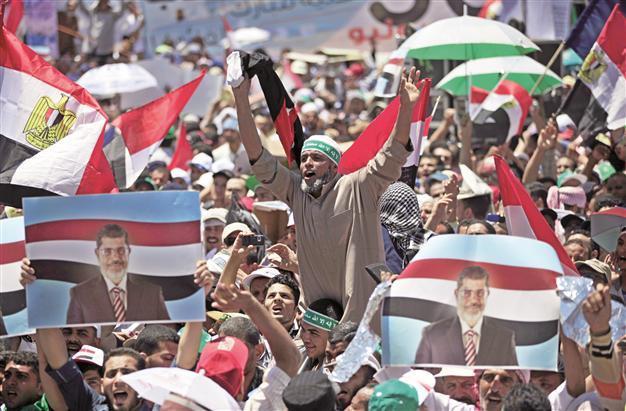Egyptian matches threaten to be foreshadow of demonstrations
JAMES M. DORSEY

Supporters of Egypt’s president Mohammed Morsi chant slogans during a rally in Nasser City in Cairo, Egypt, Friday, June 21, 2013. Tens of thousands of Islamists supporting Egypt’s president staged a show of force ahead of massive protests later this month by the opposition, chanting “Islamic revolution” and warning of a new and bloody bout of turmoil. Adding to the combustible mix, the U.S. ambassador in Egypt gets drawn into Egypt’s treacherous politics when comments interpreted as critical of
Militant, street battle-hardened supporters of crowned club Al Ahli S.C. stormed the Egyptian capital’s military stadium this weekend in defiance of a ban on spectators attending matches. The storming is a foretaste of potential violence at next weekend’s potential watershed mass anti-government demonstration that could change Egypt’s political paradigm.
This weekend’s storming and mounting tension in advance of the protest are a demonstration of the sustained mettle and resolve of the fans, one of Egypt’s largest civic groups, who played a key role in the toppling two years ago of President Hosni Mubarak and opposition to the military and the Muslim Brotherhood-led government of President Mohammed Morsi since.
The storming and concern about clashes at next weekend’s protest has sparked debate within the security forces and the military, who are widely held responsible for the deaths of some 900 protesters since the ousting of Mr. Mubarak, on how to deal with the soccer-related violence as well as the planned protest.
The interior ministry, which controls the police and security forces, initially opposed allowing Egyptian league matches to proceed because of threats by soccer fans to storm stadiums in protest against a ban on spectators. The ministry feared that clashes with fans would add to already mounting tension in advance of June 30. In an about face however, the ministry late this week said it would permit the games to be played on Saturday and Sunday instead of on Thursday and Friday as originally scheduled.
‘Last 48 hours’Fans have been largely banned from matches ever since the league resumed in February after a year-long suspension in the wake of the deaths of 74 supporters last year in a politically loaded brawl in Port Said.
“We are giving you 48 hours; we are giving you a chance to stop suppressing and provoking us. Either we return to the stands or … you will know what will happen soon,” the Ultras White Knights (UWK), the militant support group of storied Al Ahli rival Al Zamalek S.C., warned this week in a statement.
The storming signals that the fans are preparing for June 30, the first anniversary of Morsi’s inauguration as Egypt’s first freely-elected post-revolt leader, which ad hoc group Tamarud (Rebel) hopes to commemorate with a million-man march on the presidential palace. Tamarud has reportedly collected 15 million signatures, 2 million more than the 13 million votes the president garnered a year ago, on a petition demanding Morsi’s resignation and new elections.
The petition that a significant number of militant soccer fans are believed to have signed, takes Morsi to task for his failure to tackle the country’s economic crisis, dispel fears that he is pursuing an Islamist agenda, and his haughty style of government that many see as a continuation of Mubarak’s authoritarianism. It calls on the military and the judiciary in violation of the constitution to lead the country to new elections. Youth groups and soccer fans see Tamarud’s mobilization success and the June 30 march as an opportunity to reinvigorate their movement and launch a second revolution.
Fears of violence have been fuelled by attacks by Morsi supporters on Tamarud representatives as they publicly collected signatures on street corners and other public spaces. Supporters and opponents of Morsi clashed for hours last week in the Mediterranean city of Alexandria.
Tamarud insistentTo ensure the authenticity of its petition, Tamarud has insisted that signatories identify themselves and register their identity document. Irrespective of whether or not the soccer matches and the June 30 march produce the kind of violence that could shift Egypt’s political paradigm, they indicate just how deeply divided Egypt is and the degree of lack of confidence in Morsi among a significant segment of the population.
Concern that violence could prevail was reinforced by some Islamist groups calling for counter demonstrations on June 30 as well as the expectation that soccer fans and the Black Bloc, a vigilante group founded by militant soccer enthusiasts, will act as a protective and potentially provocative force during the anti-government march.
Attempts by cooler heads within Morsi’s Muslim Brotherhood and other Islamist groups to avert what could prove to be a game-changing outpour of anger against the government by reaching out to opposition groups have so far failed.
The mounting tension has further thrown the spotlight on Morsi’s troubled relationship with the security forces witness the interior ministry’s dithering on the soccer matches as well as an initial statement that police would stay away from the Tamarud demonstration that was later withdrawn. Security officials fear that the police, which is widely despised because of its enforcement of repression in the Mubarak era and its subsequent, and at times deadly, clashes with protesters, will be seen as being supportive of a Morsi government it distrusts if it comes to clashes with protesters this weekend and on June 30.
Hossam Ghali, the captain of crowned Zamalek rival Al Ahli S.C., reflected Egyptians’ worries about where there country is heading by deciding this week to postpone a decision on whether to extend his contract until after the June 30 march. “I’m now considering leaving Egypt because of the ongoing political turmoil, which is seriously affecting Egyptian football. It will be difficult to continue in Egypt under such circumstances,” Al Ahli’s website quoted him as saying.
